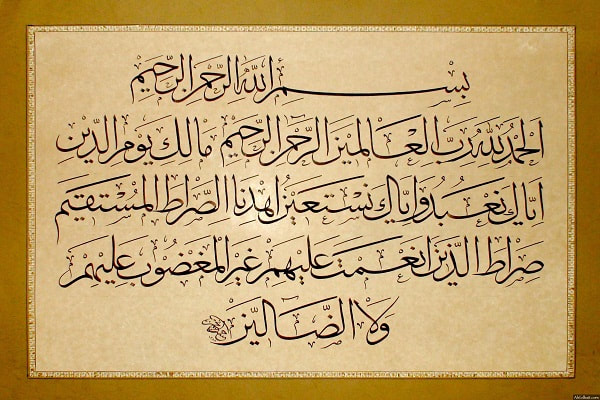 Why is Surah Al-Fatiha important? Allah ﷻ has referred to Surah Fatiha with the term As-Sab' al-Mathani which means "The Seven Often-Repeated [Verses]" in Surah Al Hijr (Chapter 15) Verse 87: “And We have certainly given you, [O Muhammad], seven of the often repeated [verses] and the great Quran.”[1] The Prophet ﷺ has referred to this Surah as Ummul Kitab i.e. Essence of the Book. In the above verse Allah ﷻ mentions the “Seven of the often repeated (verses)” separately from the word “Great Quran” which stresses the importance of these 7 verses to be as great as the entire Quran itself. This is why we can understand why the Prophet ﷺ referred to it as Essence of the Quran. The reason why Allah ﷻ has referred to it as ‘Seven Often Repeated’ is because this Surah is an essential part of the salah (5 obligatory prayers) which makes its recitation a total of 17 times a day for every practicing believer. If we add the times we recite during our sunnah and nawafil (voluntary) prayers then the total number of times will exceed 17! Due to this reason there is no doubt that it’s repeated very often throughout a believer’s day and continues to do so throughout our lives. What does Fatiha mean? This Surah is referred to with the term Fatiha which means ‘Opening’ or ‘Entrance’. When one enters a place, it is suitable to go inside only through the entrance and not any other route. Therefore it makes sense why Allah ﷻ has made it incumbent on the worshipers to recite this Surah in every Rakaah (prayer round) before choosing to recite any other Surah or verses of the Quran. Seven Verses & Seven Heavens Allah ﷻ says in the Quran that he formed the heavens in to seven heavens: “He it is who has created for you all that is on earth, and has applied His design to the heavens (Sama’a) and fashioned them into seven (sab’a) heavens (samawaat); and He alone has full knowledge of everything.”[2] A wise Shaykh has said that since our Ruh (Spirit) has come from the heavens therefore the sustenance for it also lies in the heavens. And so when we recite the seven verses of Surah Fatiha, we’re actually assisting our Ruh to spiritually transport itself through these seven heavens and bond itself with Allah ﷻ, Who is high, above and beyond these heavens. Since Fatiha means ‘Opening’, this Surah opens the door for our Ruh to begin its spiritual journey, the goal of which is to connect itself with Allah ﷻ. Each verse of this Surah symbolizes as a step that assists a believer’s mind and heart to cross each heaven, thus by the time we have recited all seven verses with full concentration, we should be able to experience a communion and joy unlike any other. It is due to this reason why Prophet ﷺ said “As salatu Mi’raajul Mu’mineen” which means “That in salaah there is the Mi’raaj of the believer”. The Mi’raaj (Ascension) is the event when Prophet ﷺ himself was transported through the seven heavens till he came closest to Allah ﷻ in communion. Surah Fatiha – The Means of Conversation with Allah ﷻ The Prophet ﷺ informed us that Allah ﷻ responds to every verse of Surah Fatiha that we recite during our Salah. In a hadith e qudsi the Prophet ﷺ said that Allah ﷻ has said: “I have divided Salaah between Myself and My servant into two halves, and My servant shall have what he has asked for. When the servant says: "Al-hamdu lillahi rabbi l-alamin" (3), Allah ﷻ says: "My servant has praised Me". And when he says: "Ar-rahmani r-rahim" (4), Allah ﷻ says: "My servant has extolled Me", and when he says: "Maliki yawmi d-din" (5), Allah ﷻ says: "My servant has glorified Me" - and on one occasion He said: "My servant has submitted to My power." And when he says: "Iyyaka na budu wa iyyaka nasta in" (6), He says: "This is between Me and My servant, and My servant shall have what he has asked for". And when he says: "Ihdina s-sirata l- mustaqim, siratal ladhina an amta alayhim ghayril-maghdubi alayhim wa la d-dallin" (7), He says: "This is for My servant, and My servant shall have what he has asked for.”[3] This tradition explains the importance of Surah Fatiha even more, that reciting it helps us to spiritually conversate with Allah ﷻ. In another narration from the Prophet ﷺ we are told: “Dua (supplication) is the essence of Ibaadah (worship).”[4] In other words Dua which is pleading and expressing one’s neediness before Allah ﷻ is the essence of Ibaadah (worship) during our Salaah and Surah Fatiha are the exact words we require to fulfill the purpose of worship to enjoy a spiritual communion with Allah ﷻ. References: [1] Al Quran 15:87 [2] Al Quran 2:29 [3] It was related by Muslim also by Malik, at-Tirmidhi, Abu-Dawud, an-Nasa'i and Ibn Majah - https://sunnah.com/qudsi40/8 [4] Jami at-Tirmidhi 3371 - Sunnah.com
0 Comments
Leave a Reply. |
Proudly powered by Weebly
 RSS Feed
RSS Feed